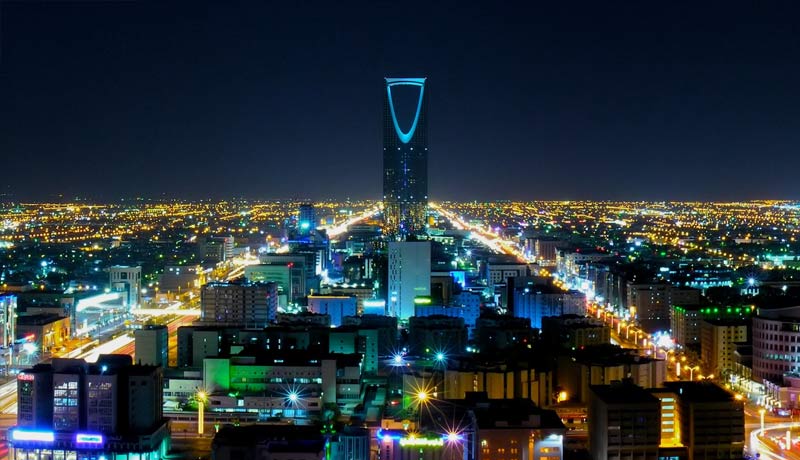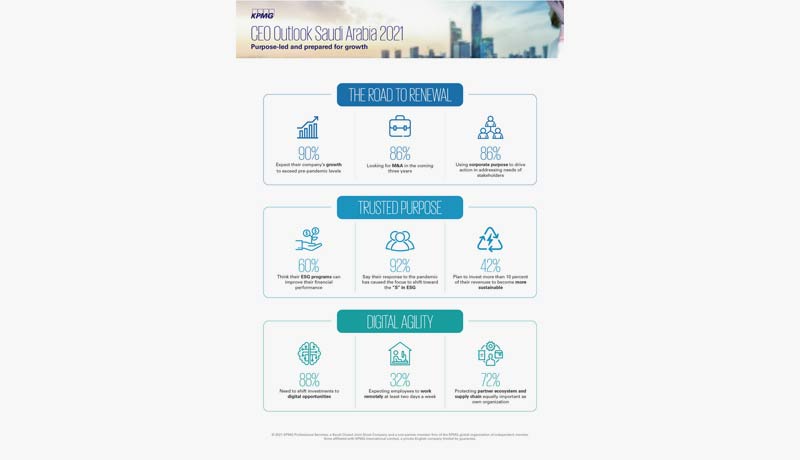
According to KPMG‘s annual CEO Outlook, the majority of Saudi Arabian CEOs are incorporating environmental, social, and governance (ESG) practices into their company plans for sustainable growth as their risk profile swings toward disruptive technology and environmental concerns.
“We notice that CEOs are putting ESG at the center of their organization’s long-term growth strategies. It’s been encouraging to see this trend and to see business leaders successfully tie their organization’s economic success to their ESG agendas. CEOs have proven they can be drivers of positive change,” commented Dr. Abdullah Al Fozan, Chairman of KPMG in Saudi Arabia.
In Saudi Arabia, 84% of the CEOs have confidence in the Kingdom’s growth, while 90% expect their company to exceed pre-pandemic levels. “The pandemic is not over, but CEOs are increasingly confident about economic growth in Saudi Arabia and globally,” added Dr. Al Fozan.
“With potential abound, CEOs are hoping to get on the front foot to position their businesses to capture it. Inorganic growth strategies are a popular choice to seize these opportunities. Business leaders are looking to expand organically and continue to assess the future of work to ensure they can attract top talent.”
“Resilience will be key to economic recovery. Along with specific interventions — from managing talent risk to building cyber defenses — CEOs will need to surround themselves with resilient people. They will also need to identify the ESG investments that are necessary to drive long-term value.”
“CEOs need to have a people-first mindset — investing in new technologies and human capability. They need to be purpose-led — winning the trust of stakeholders and helping build a more prosperous and sustainable world,” Dr. Al Fozan concluded.
The CEU Outlook Saudi Arabia 2021: Purpose-led and Growth-Ready is based on a global survey of 1,325 CEOs, 50 of whom are from Saudi Arabia, as well as interviews with business leaders in the Kingdom. All respondents situated in the Kingdom represent businesses with revenues of more than US$500 million, with 60% having revenues of more than US$1 billion.

Due to rising stakeholder pressure, CEOs are prioritizing people to drive societal return, with 92 percent of CEOs in the Kingdom stating that the epidemic has shifted their focus to the social component of their ESG programs. In contrast, only 30% of CEOs in the Kingdom believe they will have difficulty meeting diversity and inclusion requirements, compared to 56% internationally.
Progress on climate change would necessitate effort from both businesses and governments, according to a KPMG survey, which found that 42 percent of Saudi CEOs aim to invest more than 10% of their revenues in becoming more sustainable. ESG programs have been found to boost financial performance by six out of ten CEOs in the Kingdom.
According to the journal, CEOs in Saudi Arabia are enthusiastic, confident and expect aggressive growth through acquisitions and other inorganic techniques. In the next three years, about 86 percent of CEOs in the Kingdom are considering mergers and acquisitions (M&A) deals as a way of expansion. They need to be quick to move the capital to digital potential, according to a comparable figure of 88 percent.
CEOs emphasise purposeful leadership, with an emphasis on digital transformation and upskilling an agile workforce.
Saudi Arabia’s CEOs are enhancing their company’s digital advantage by creating a more flexible future of work and collaborating with digital ecosystems. Although major modifications to the office layout are uncommon, CEOs are more adaptable, with 32% anticipating most staff to work remotely at least two days per week and 28% considering acquiring remote talent.
Growth and resilience, ESG and financial value, and the future of work are three action areas that KPMG recommends CEOs focus on as they try to develop beyond the pandemic’s impact.
Many firms performed admirably during the epidemic, demonstrating resilience in the face of significant change, uncertainty, and disruption.